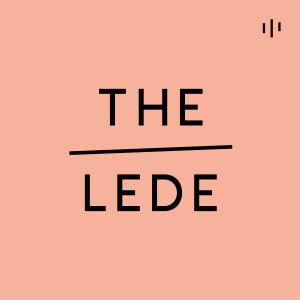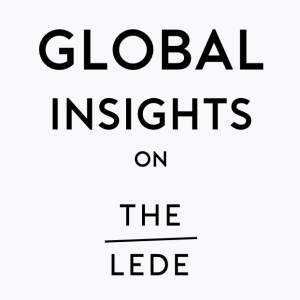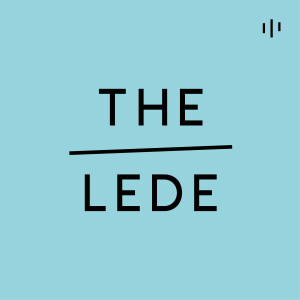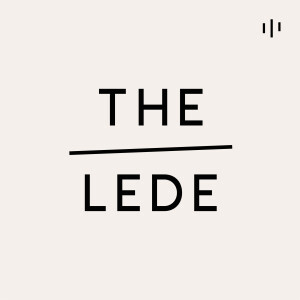Episodes

Friday Mar 07, 2025
Friday Mar 07, 2025
One of the most pressing questions facing communities from Ukraine to Syria concerns the roles accountability and justice should play in the transition out of periods of conflict. Janine di Giovanni, executive director of The Reckoning Project, joins New Lines’ Faisal Al Yafai on the podcast after returning from a trip to Syria, as does New Lines’ Middle East Editor Kareem Shaheen.
Produced by Finbar Anderson

Friday Feb 28, 2025
Friday Feb 28, 2025
On this episode of Global Insights on The Lede, Ukrainian journalist Mykhaylo Shtekel and New Lines’ Amie Ferris-Rotman join host Kwangu Liwewe to discuss how U.S. President Donald Trump’s upending of established alliances has presented Ukraine with a dilemma that may change the course of its future.
Produced by Finbar Anderson

Friday Feb 21, 2025
Friday Feb 21, 2025
The global geopolitical landscape is changing, but not in the way you might think. In place of traditional armies facing off on the battlefield, or nuclear-backed superpowers, there's a new force: AI. On this week’s episode of The Lede, politician and New Statesman columnist Bruno Maçães, author of “World Builders: Technology and the New Geopolitics,” tells New Lines’ Faisal Al Yafai how the battle lines are being drawn in a virtual world — and how the builders of the strongest AI language models will be the true power brokers of the future.
Produced by Finbar Anderson

Friday Feb 14, 2025
Friday Feb 14, 2025
On this week’s episode, writer Raphael Cormack tells New Lines’ Finbar Anderson about the mystics who fused elements of the spiritual and the modern to build huge followings from Beirut to New York in the early 20th century, as described in his new book “Holy Men of the Electromagnetic Age: A Forgotten History of the Occult.”
Produced by Finbar Anderson

Friday Feb 07, 2025
Friday Feb 07, 2025
On this episode, Erik Baker, author of “Make Your Own Job: How the Entrepreneurial Work Ethic Exhausted America,” tells New Lines’ Faisal Al Yafai how the culture of entrepreneurialism came to dominate modern America.
Produced by Finbar Anderson

Friday Jan 31, 2025
Friday Jan 31, 2025
On this episode of the podcast, New Lines’ Kwangu Liwewe discusses the poorly understood BRICS group with Gustavo de Carvalho, a senior researcher at the South African Institute of International Affairs, against the backdrop of U.S. President Donald Trump’s threat of heavy sanctions against the group should they pursue a rumored policy of moving away from the U.S. dollar.
Produced by Finbar Anderson

Friday Jan 24, 2025
Friday Jan 24, 2025
Following the dramatic recent political developments in Syria, Ammar Azzouz, author of “Domicide: Architecture, War and the Destruction of Home in Syria,” and Wendy Pearlman, author of “The Home I Worked To Make: Voices From the New Syrian Diaspora,” join New Lines’ Lydia Wilson on The Lede to discuss how conflict and exile have shaped Syrians’ idea of home, and how that might change in an uncertain future.
Produced by Finbar Anderson

Friday Jan 17, 2025
Friday Jan 17, 2025
On this week’s episode, acclaimed journalist and author Robert Kaplan joins New Lines’ Faisal Al Yafai on The Lede for a discussion on Donald Trump, the Iraq War and his new book “Waste Land: A World in Permanent Crisis.”
Further listening: The American Experiment From Outside and Within — with Hari Kunzru and Faisal Al Yafai
Produced by Finbar Anderson

Friday Jan 10, 2025
Friday Jan 10, 2025
Will 2025 bring resolutions to the many news stories of the previous year? Four of New Lines’ editors consider the upcoming second Donald Trump presidency, the conflicts in Gaza and Ukraine, possible turbulence in Europe and the future for Syria.
Further listening:Survival and Statehood in Ukraine — with Yaroslav Trofimov
Produced by Finbar Anderson

Friday Jan 03, 2025
Friday Jan 03, 2025
Returning to the podcast, Mary Kaldor, professor emeritus of global governance at the London School of Economics, joins New Lines’ Lydia Wilson for a discussion on how to end the various intractable wars still raging in 2025, from Gaza to Ukraine.
Produced by Finbar Anderson





